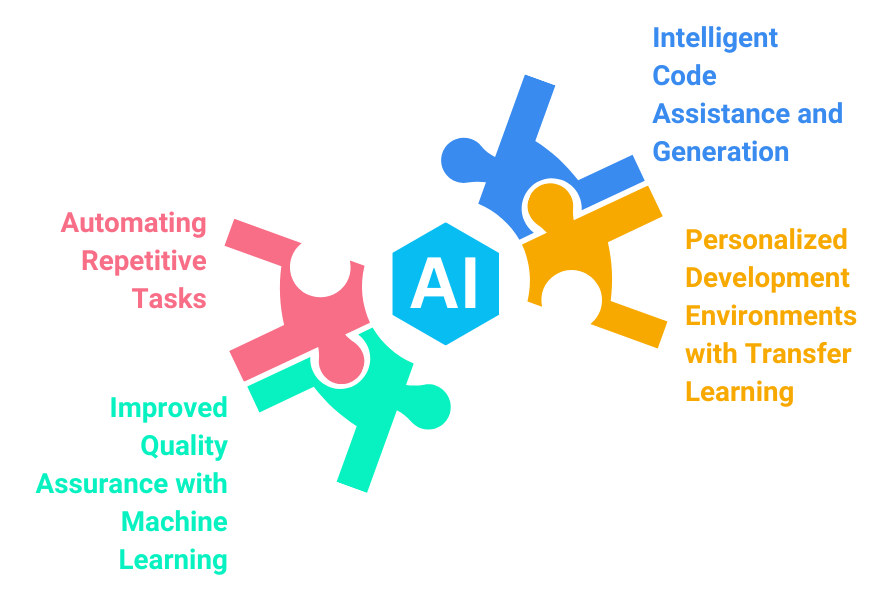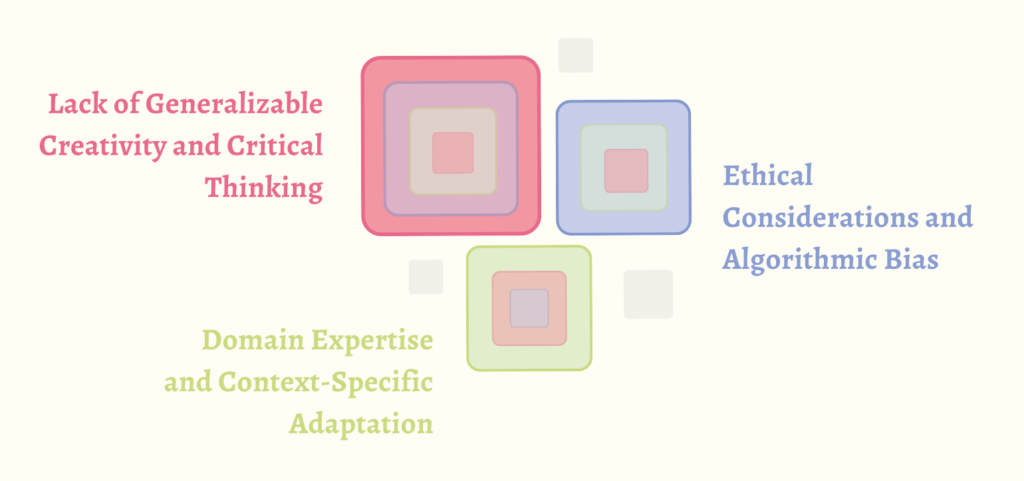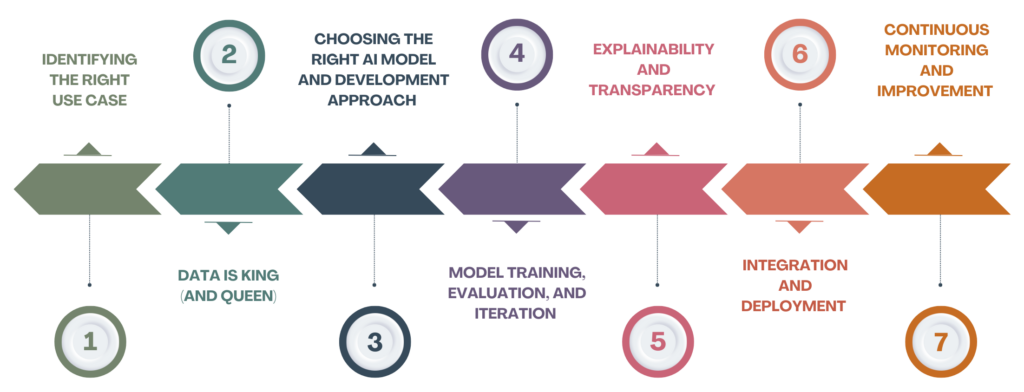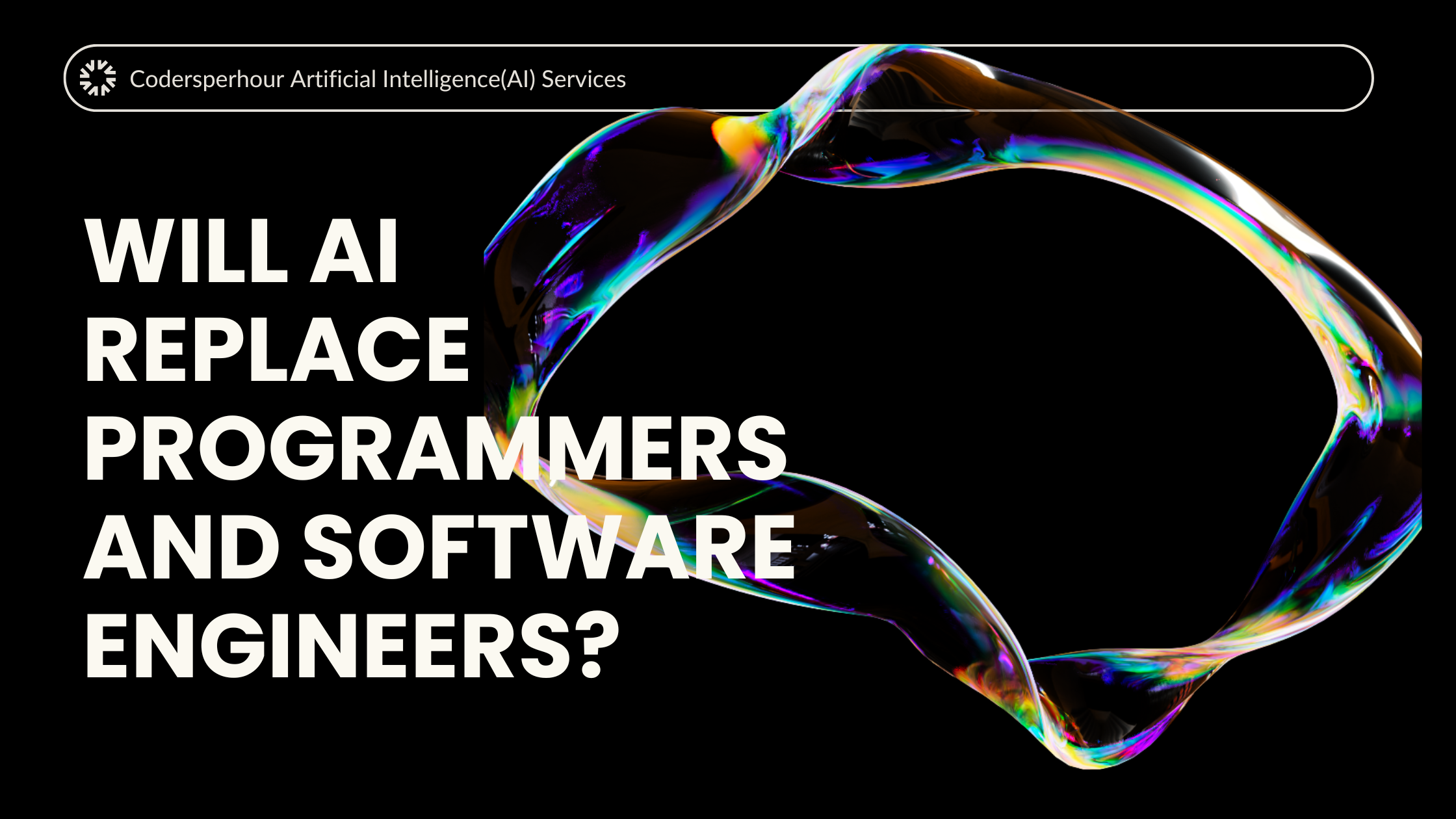The coding world is abuzz with speculation. A recent survey by [Credible Tech Survey Organization] found that 72% of programmers expressed concern about AI replacing their jobs. Headlines scream, “AI to Code the Future: Programmers Beware!” But are these fears justified?
In 2024, Artificial Intelligence (AI) is undeniably weaving itself into the fabric of software development. However, the narrative of a robot takeover in the coding trenches is far from reality. Instead, a fascinating era of symbiosis is emerging, where AI and programmers work together to push the boundaries of what’s possible.
This article dives deeper than the clickbait headlines. We’ll separate fact from fiction, exploring how AI is impacting the software development landscape. We’ll delve into specific ways AI is augmenting programmers’ capabilities, leading to a new age of efficiency and innovation. Finally, we’ll unpack the evolving skillsets that programmers will need to thrive in this AI-powered future.
So, let’s silence the doomsday pronouncements and explore the exciting possibilities of a human-AI partnership. Together, programmers and AI have the potential to revolutionize the world of software development, creating a future that’s far more collaborative than competitive.
AI’s Impact on Programmers and Software Engineers
The rise of AI in software engineering isn’t a melody of doom and gloom. While headlines often portray AI as a looming threat, the reality is far more nuanced. AI is having a significant impact on software engineers, bringing both a symphony of benefits and accompanying limitations to the table.
Benefits of AI in Software Engineering

- Automating Repetitive Tasks: Imagine a world where programmers are freed from the mundane tasks of writing boilerplate code or fixing well-documented bugs. A study by McKinsey & Company found that AI can automate up to 70% of these repetitive coding tasks. This shift isn’t eliminating jobs; it’s allowing programmers to focus on higher-level cognitive activities like designing complex algorithms, optimizing software architectures, and tackling intricate problem-solving challenges. This not only translates to increased development efficiency but also boosts programmer satisfaction by eliminating the drudgery of repetitive coding.
- Intelligent Code Assistance and Generation: AI is no longer a passive observer in the development process. It can act as an intelligent assistant, generating code snippets based on natural language descriptions or existing code patterns. This significantly accelerates development cycles. For example, AI-powered code completion tools can leverage natural language processing (NLP) to suggest relevant code based on a programmer’s current code block, reducing errors and saving time. Stack Overflow’s 2024 developer survey found that 62% of programmers already utilize AI-powered code completion tools regularly.
- Improved Quality Assurance with Machine Learning: Software engineers can leverage AI’s machine learning capabilities to achieve a new level of quality assurance. Machine learning algorithms can be trained on vast code repositories to identify patterns that might indicate bugs or security vulnerabilities. This proactive approach (potentially reducing development time by up to 15% according to a recent study by Forrester Research) helps prevent costly bugs from reaching production environments and ensures the overall reliability of software.
- Personalized Development Environments with Transfer Learning: AI can personalize development environments to cater to individual programmer preferences and coding styles. This can involve leveraging transfer learning techniques to suggest relevant code libraries and documentation based on a programmer’s past work. Additionally, AI can anticipate potential coding challenges by analyzing a programmer’s coding history, leading to a more streamlined development workflow.
Limitations of AI in Software Engineering

- Lack of Generalizable Creativity and Critical Thinking: While AI excels at automating tasks and identifying patterns, it currently lacks the human ability for generalizable creativity and critical thinking. Complex software problems often require out-of-the-box solutions and a deep understanding of the broader context, which are still the domain of human ingenuity.
- Domain Expertise and Context-Specific Adaptation: AI models are trained on massive datasets, but these datasets may not always encompass the specific nuances of a particular software project. Without a deep understanding of the software’s purpose and the broader domain context, AI can struggle to adapt to unforeseen scenarios or generate code that perfectly aligns with project goals.
- Ethical Considerations and Algorithmic Bias: AI algorithms are only as objective as the data they’re trained on. Biased data sets can lead to discriminatory outcomes in code generation or decision-making processes within software. Mitigating bias in AI development and deployment is crucial for ensuring fairness and ethical software engineering practices.
The impact of AI on programming jobs
AI is undeniably impacting the programming landscape, but not as an existential threat – it’s more akin to a restructuring force. Let’s delve into the specific ways AI is affecting programming jobs:
Automating Repetitive Tasks
Instead of picturing a programmer’s utopia, here’s a scenario: AI handles the tedious chores of software development, like churning out repetitive code or squashing well-understood bugs. This shift isn’t about eliminating jobs; it’s about freeing programmers to concentrate on more intellectually demanding endeavors. We’re talking about designing intricate algorithms, optimizing software structures, and conquering complex problems. This not only translates to faster development cycles but also boosts programmer morale by eliminating the repetitive coding grind.
Evolving Skillsets
The skillset required for success as a programmer in 2024 is evolving. While core programming languages remain fundamental, understanding AI principles and how to work effectively with AI tools is becoming increasingly important. This might involve familiarity with machine learning concepts, leveraging AI-powered code completion tools, or integrating pre-trained AI models into software applications. Programmers who embrace AI and develop these new skillsets will be well-positioned to thrive in the evolving software development landscape.
A Shift Towards Specialization
As AI automates more tasks, we might see a shift towards specialization within programming roles. Programmers with expertise in specific areas like natural language processing (NLP) or computer vision might be in high demand to develop and integrate these AI functionalities into software applications. Additionally, the role of the “AI whisperer” – programmers who bridge the gap between software development and AI – may become increasingly crucial for ensuring effective communication and collaboration between these two disciplines.
Potential Job Market Disruption for Certain Roles
While AI isn’t eliminating entire programming professions, it could potentially disrupt specific roles. For example, positions heavily focused on repetitive coding tasks like web scraping or data entry might see a decline in demand as AI automates these. However, this disruption can be mitigated through continuous learning and upskilling to adapt to the changing requirementsf the job market.
Best Practices for Implementing AI
The rise of AI in software development isn’t just about using AI tools; it’s about integrating AI effectively into the development lifecycle. Here are some key best practices for successful AI implementation in 2024:

Identifying the Right Use Case
Not every software project needs AI. The first step is to identify a clear use case where AI can demonstrably improve development efficiency, and software quality, or address a specific problem that traditional methods struggle with. Focusing on well-defined use cases ensures AI is implemented strategically and delivers tangible benefits.
Data is King (and Queen)
The old adage, “garbage in, garbage out,” holds true for AI. The quality of data used to train AI models directly determines their performance. Organizations must prioritize data integrity, ensuring accuracy, completeness, and relevance to the specific use case. Additionally, robust data governance practices are essential. This includes adhering to data privacy regulations and actively mitigating potential biases within the datasets. Biased data can lead to discriminatory outcomes in AI-powered software, so organizations must address bias throughout the development process to ensure fair and ethical AI.
Choosing the Right AI Model and Development Approach
There’s no one-size-fits-all approach to AI development. Different use cases require different AI models and development techniques. Understanding the strengths and weaknesses of various models (e.g., deep learning, decision trees) is essential for choosing the most appropriate tool for the job. Consulting with AI specialists and leveraging cloud-based AI development platforms can streamline the development process and provide access to pre-trained models and development tools.
Model Training, Evaluation, and Iteration
Training an AI model is an ongoing learning process. Once the data and model type are chosen, the training phase begins. Here, the data is fed into the model, allowing it to learn patterns and relationships within the information. To assess the model’s effectiveness, rigorous evaluation metrics are established. These metrics identify areas for improvement, guiding further training. This iterative process, involving continuous feedback loops, is crucial for optimizing the model’s performance and ensuring it delivers the desired results.
Explainability and Transparency
The year 2024 marks a shift in AI development. Opaque, “black box” models are no longer sufficient. Organizations are prioritizing the development of interpretable AI, where stakeholders can understand the reasoning behind a model’s outputs. Techniques like interpretable machine learning (ML) are key to achieving this transparency. Building trust in AI systems is paramount. Explainability allows users to see the “why” behind AI decisions, fostering confidence and ensuring the models align with ethical principles. When we understand how AI arrives at its conclusions, we can ensure fairness and mitigate potential biases.
Integration and Deployment
Developing a well-trained and evaluated AI model is just one step. The next crucial phase involves integrating it seamlessly into the software development lifecycle. This might involve deploying the model as a web service (API) accessible by other applications, or directly embedding it within the software itself. Security considerations are paramount during deployment. Rigorous testing procedures must be implemented to ensure the AI model functions flawlessly within the broader software system. Only then can developers be confident the AI delivers the intended results and operates securely within the software’s ecosystem.
Continuous Monitoring and Improvement
AI models are not static entities. They require continuous monitoring to track performance over time and identify potential issues like bias drift or performance degradation. Regular audits and feedback loops should be established to ensure AI systems continue to meet ethical and performance standards. The ability to adapt and improve AI models over time is crucial for their long-term success within software development.
The Future of Programmers and Software Engineers in the AI Era
The rise of AI in software development has undoubtedly sparked anxieties about the future of programmers and software engineers. However, the narrative surrounding AI as a replacement force is far from reality. In 2024, we are witnessing the emergence of a far more optimistic vision – one built on collaboration.
The future of software development isn’t a battleground between humans and AI, it’s a stage for a powerful human-AI partnership. Programmers who embrace AI and continuously hone their skills will be the architects of tomorrow’s software revolution. This collaborative approach is the key to unlocking the next generation of groundbreaking software solutions. Here, human ingenuity and creativity are amplified by the capabilities of AI, leading to advancements beyond what either could achieve alone. The future is bright for programmers and software engineers – not as adversaries of AI, but as collaborators shaping the future of software development together.
At Codersperhour, we believe in empowering programmers to thrive in this evolving landscape. We offer a comprehensive suite of AI-powered development tools and training programs designed to bridge the gap between human and artificial intelligence. By fostering a culture of human-AI collaboration, we can unlock the true potential of software development and create groundbreaking solutions that shape the future.
Ready to embrace the future of software development? Contact Codersperhour today and see how we can help you harness the power of AI.


